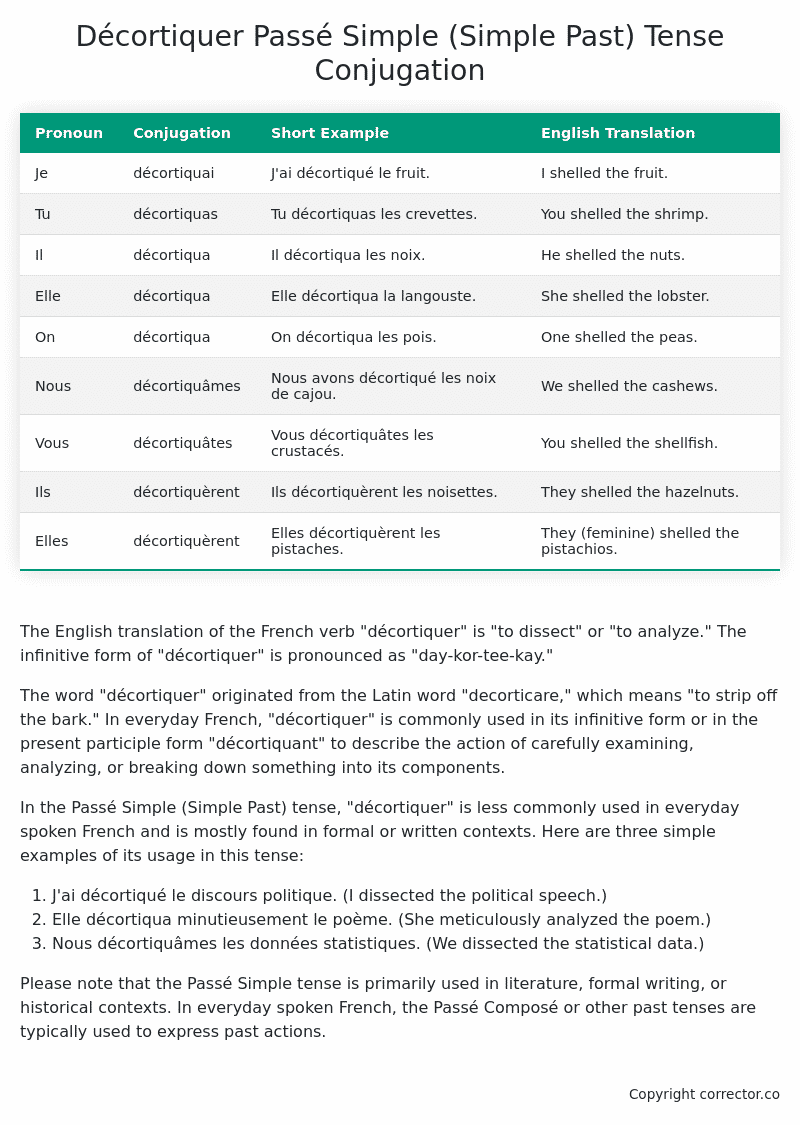Passé Simple (Simple Past) Tense Conjugation of the French Verb décortiquer
Introduction to the verb décortiquer
The English translation of the French verb “décortiquer” is “to dissect” or “to analyze.” The infinitive form of “décortiquer” is pronounced as “day-kor-tee-kay.”
The word “décortiquer” originated from the Latin word “decorticare,” which means “to strip off the bark.” In everyday French, “décortiquer” is commonly used in its infinitive form or in the present participle form “décortiquant” to describe the action of carefully examining, analyzing, or breaking down something into its components.
In the Passé Simple (Simple Past) tense, “décortiquer” is less commonly used in everyday spoken French and is mostly found in formal or written contexts. Here are three simple examples of its usage in this tense:
- J’ai décortiqué le discours politique. (I dissected the political speech.)
- Elle décortiqua minutieusement le poème. (She meticulously analyzed the poem.)
- Nous décortiquâmes les données statistiques. (We dissected the statistical data.)
Please note that the Passé Simple tense is primarily used in literature, formal writing, or historical contexts. In everyday spoken French, the Passé Composé or other past tenses are typically used to express past actions.
Table of the Passé Simple (Simple Past) Tense Conjugation of décortiquer
| Pronoun | Conjugation | Short Example | English Translation |
|---|---|---|---|
| Je | décortiquai | J’ai décortiqué le fruit. | I shelled the fruit. |
| Tu | décortiquas | Tu décortiquas les crevettes. | You shelled the shrimp. |
| Il | décortiqua | Il décortiqua les noix. | He shelled the nuts. |
| Elle | décortiqua | Elle décortiqua la langouste. | She shelled the lobster. |
| On | décortiqua | On décortiqua les pois. | One shelled the peas. |
| Nous | décortiquâmes | Nous avons décortiqué les noix de cajou. | We shelled the cashews. |
| Vous | décortiquâtes | Vous décortiquâtes les crustacés. | You shelled the shellfish. |
| Ils | décortiquèrent | Ils décortiquèrent les noisettes. | They shelled the hazelnuts. |
| Elles | décortiquèrent | Elles décortiquèrent les pistaches. | They (feminine) shelled the pistachios. |
Other Conjugations for Décortiquer.
Le Present (Present Tense) Conjugation of the French Verb décortiquer
Imparfait (Imperfect) Tense Conjugation of the French Verb décortiquer
Passé Simple (Simple Past) Tense Conjugation of the French Verb décortiquer (You’re reading it right now!)
Passé Composé (Present Perfect) Tense Conjugation of the French Verb décortiquer
Futur Simple (Simple Future) Tense Conjugation of the French Verb décortiquer
Futur Proche (Near Future) Tense Conjugation of the French Verb décortiquer
Plus-que-parfait (Pluperfect) Tense Conjugation of the French Verb décortiquer
Passé Antérieur (Past Anterior) Tense Conjugation of the French Verb décortiquer
Futur Antérieur (Future Anterior) Tense Conjugation of the French Verb décortiquer
Subjonctif Présent (Subjunctive Present) Tense Conjugation of the French Verb décortiquer
Subjonctif Passé (Subjunctive Past) Tense Conjugation of the French Verb décortiquer
Subjonctif Imparfait (Subjunctive Imperfect) Tense Conjugation of the French Verb décortiquer
Conditionnel Présent (Conditional Present) Tense Conjugation of the French Verb décortiquer
Conditionnel Passé (Conditional Past) Tense Conjugation of the French Verb décortiquer
Conditionnel Passé II (Conditional Past II) Tense Conjugation of the French Verb décortiquer
L’impératif Présent (Imperative Present) Tense Conjugation of the French Verb décortiquer
L’impératif Passé (Imperative Past) Tense Conjugation of the French Verb décortiquer
L’infinitif Présent (Infinitive Present) Tense Conjugation of the French Verb décortiquer
L’infinitif Passé (Infinitive Past) Tense Conjugation of the French Verb décortiquer
Le Participe Présent (Present Participle) Tense Conjugation of the French Verb décortiquer
Le Participe Passé (Past Participle) Tense Conjugation of the French Verb décortiquer
Struggling with French verbs or the language in general? Why not use our free French Grammar Checker – no registration required!
Get a FREE Download Study Sheet of this Conjugation 🔥
Simply right click the image below, click “save image” and get your free reference for the décortiquer Passé Simple tense conjugation!

Décortiquer – About the French Passé Simple (Simple Past) Tense
Formation
Usage
Narration
Historical Context
Interactions with other tenses
Passé Composé
Imparfait
Conditional and Subjunctive
Summary
I hope you enjoyed this article on the verb décortiquer. Still in a learning mood? Check out another TOTALLY random French verb conjugation!


